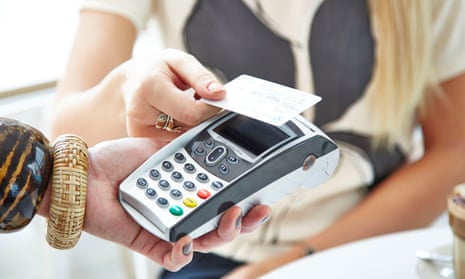Spending on credit cards leaped £700m in August as households borrowed heavily to cope with the cost of living crisis.
The increase at a time of heightened anxiety about rising energy bills pushed the annual growth rate in spending on credit cards to 12.9%, its joint highest level since 2005, according to Bank of England data.
Economists said the jump in credit card balances this year to £5.9bn showed the stress on many households as they struggled to make ends meet.
In periods when the economy is growing, high levels of credit spending are attributed to consumer confidence, but economists said high inflation and indications that the economy is heading for a recession meant it was more likely households were using their cards to pay food bills and other essential items.
Maintaining a high level of credit borrowing was also becoming more expensive after an increase in the average interest rate 18.66% in August, above the 18.55% seen before the pandemic.
The annual growth rate for all consumer credit remained at 7.0% in August; the highest rate since March 2019when it hit 7.2%.
In a further sign of the stress on family budgets, households continued to deposit less money into their accounts than they did before 2020.
The combined net flow into bank and building society deposit accounts and NS&I accounts in August was unchanged at £4.3bn, remaining below the average monthly flow of £5.5bn during the 12 months before the pandemic period up to February 2020.
Laura Suter, the head of personal finance at the stockbroker AJ Bell, said: “Credit card borrowing remains at a 17-year high as more people turn to plastic to cover rising costs.”
after newsletter promotion
The addition of personal loans and car finance took the total level of consumer borrowing to £10.5bn this year.
“But this figure hides the true scale of the nation’s debts as it doesn’t include ‘buy now pay later’ borrowing and more informal loans between family and friends,” she said.
